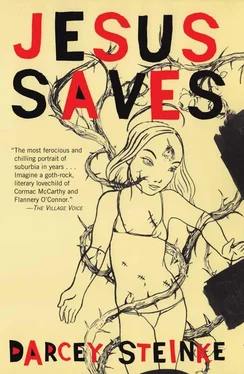Over her shoulder, she saw the red bee floating toward her back and felt its sting a second time, the pain a star shape, hot and cold, and then the troll cleared a rag of phlegm from his throat and the cigarette tip illuminated his fingers and he pushed the fire into the valley between his hairy knuckles and a pinched growl came out of his throat.
Save me Jesus. Save me Lord. She smiled at the spiders dangling like acrobats above her head, listened to the mouse's minuscule feet gallop against the far wall. The bear wore a velvet top hat and his emerald ring. He said reading the letter put him in the mood to recite a little poem he'd composed all by himself. Never eat porridge from an ivory spoon. Don't drink all the sumac wine or you'll die too soon. Kneel down by the tiger lilies on hot summer days. Don't ever bother reading those boring Shakespeare plays.
Sandy heard the troll lock the basement door. She blew her own warm breath down between her breasts in an effort to heat up her heart. A teaspoon of light glinted on the shovel lying against the far wall. She was a little monkey. She was a little bird.
Mulhoffer, using an unsharpened yellow pencil to point out figures on a flowchart, spoke enthusiastically about the church's future. He had a folksy delivery and low-key self-confidence that was undeniably contagious. His bald, egg-shaped head flushed pink with enthusiasm and every once in awhile he hitched up his pants. This gesture gave his presentation a sort of agrarian earnestness that worked like an aphrodisiac on the crowd. Men and women sat on pew's edge nodding at the architectural rendering of the future church complex. Designed by the same person who built the mall, it was a nondescript cement-block behemoth with long thin windows and an indoor water fountain.
She sat in the back pew near old Klass. Taking a taxi all the way here from his garden apartment downtown had exhausted him and he dozed silently; a spot of drool grew on the lapel of his dandruff-flecked jacket. Her father sat in the front pew and, as usual, played it all wrong. His features set in an arrogant mask, he gazed out the window as if Mulhoffer's speech was of no interest to him.
But Ginger knew better. His flushed neck and trembling chin implied that he was nearly hysterical with worry.
In the pew ahead sat the couple with adopted children. They were nice; the woman brought over a tuna fish casserole when her mother died. The woman's husband, thinking she needed direction, cornered her in the church parking lot and spoke animatedly about his marketing firm. But Ginger could never follow his words: telemarketing, annual quotas, targeted merchandising. The words evaporated as he said them and she'd just stare at him blankly and nod her head. But he meant well, they all did. There wasn't a single person present who didn't smile at her on Sunday mornings. So why did she feel like they were all zombies waiting in line to suck her blood?
At the end, just after Mulhoffer proposed buying TV time on the local channel and hiring a small, three-piece band, he praised her father for his devoted service to Good Shepherd. Mulhoffer winked at the congregation as he joked about her father's intelligence, his love of reading. “I can't even pronounce the names of the guys he studies, let alone get through a page of their books.” Her father, Mulhoffer said, had done a fine job at Good Shepherd, had an obvious love for God's word, but he was clearly overworked and needed a helpmate, a CO-pastor.
* * *
The teakettle rang out on the little hot plate her father set up on the edge of his desk, next to the Lutheran seal paperweight and a pile of church-supply catalogues. He turned off the heat and poured water into his mug, stirred the instant coffee crystals until each one dissolved, added a packet of creamer. Now that they were alone in the office, waiting for the congregation to vote, the wind dropped out of her father, left him exhausted and spaced out. A blanket from home lay folded neatly next to the desk and he brought a pillow from his bed. She realized, watching him pick through his mail, that he'd been sleeping here not because of his obsession with God's word and its connection to the salvation of Sandy Patrick, but because he thought that if he kept vigil he could somehow heal the rift between himself and his church.
Her mother always claimed that her father was singularly unsuited for the ministry. Because he was so sensitive, so easily able to cry, sad situations made him act stiff and officious, which alienated him from the very people he was meant to comfort. Most ministers, worn out by the perpetual worries of others, created a cheerful persona and spoke in coded clichés about God's will, but her father was still uncomfortable with his position as God's representative, thought it slightly embarrassing and somewhat absurd.
Ginger swung her legs over the edge of the wingback chair and her father glanced up at her as if he'd forgotten she was there.
“You know I'll have to quit,” he said.
Ginger nodded. But what would he do? At the end her mother had laughed in his face, said he was unfit not just for the ministry but for every other job too. He was a dreamer. “The world,” she'd said, “has no room for men who believe in angels.”
“But it's not the end of the world,” her father said, trying to sound parental and reassuring. Maybe it was in the pestiferous nature of the ministry, maybe the lack of imperatives in the spiritual life, but even as a little girl, he never made her feel safe.
There was a knock on the door and he said, “That'll be Mulhoffer. You should go.”
“Let me stay with you, Dad,” she said. Fear and dread nibbled at her heels. She was always terrified of his vulnerability and wanted now to protect him any way she could.
“No,” he shook his head, “you—”
The door opened and Klass hobbled inside. “Excuse me, Pastor.”
“It's okay, Klass. It's just my daughter. Please come in.”
“It's a shame, Pastor,” he said, leaning heavily on his cane, his face filled with nostalgia, “it's enough to drive me over to the Catholics.”
“Oh, Klass,” her father said, laughing, “anything but that.”
Ginger didn't feel like going home and reading over the employment ads in the newspaper, as her father suggested. She wanted to check on the girl who'd called last night and read her horoscope and an article from her mother's fashion magazine about spring sandals and the importance of proper accessories. There was an edge of terror in her voice when Ginger said she needed to get some sleep. She asked a flurry of questions: Did she believe in love at first sight? Were rich people happier than poor? If God existed, why would he let planes fall out of the sky and cars crash on the highway? Why would he allow people to get married who weren't really in love? When Ginger insisted she had to get off the phone, the girl said she heard a noise, something rattling the window, somebody creeping around in the basement.
Ginger rang the doorbell. “I'm giving myself a beauty treatment,” the girl said as she opened the door, mud dried chalky on her cheeks, wetter around the ridges of her nose. The girl's eyes were as bright as green crocus knobs pushing up under a cover of dead leaves. She explained how she'd walked over to Revco and bought a facial pack, a hot oil treatment, shaving cream, special lotion. She'd tried on all the sunglasses on the display rack but none were glamorous enough. And did Ginger know about the place in the mall where they gave you a makeover, changed you into a winter queen or a butterfly princess, and then took your picture like a model?
She gripped Ginger's hand and pulled her toward the bathroom, telling how she'd called the boy she liked, the one who was teaching his dog hand signals.
Читать дальше












